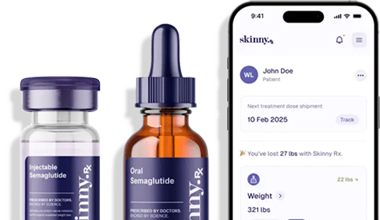
Key Takeaways
- Burping, including sulfur or egg-smelling burps, is a common side effect of semaglutide, especially with Wegovy®, affecting up to 7% of users.
- Semaglutide slows down digestion, leading to increased burping, gas, and other gastrointestinal symptoms, particularly during dose adjustments or dietary changes.
- To reduce burping, stay hydrated, avoid carbonated drinks, limit gas-producing foods, moderate fiber, eat smaller and slower meals, exercise, and consider OTC remedies with a doctor’s advice.
- Burping usually improves as your body adjusts; however, severe or persistent symptoms, such as severe pain, vomiting, or jaundice, require prompt medical attention.
If you’ve been dealing with excessive burping on semaglutide, we’re here to tell you that you’re not alone. While nausea and diarrhea seem to hog all the headlines, semaglutide burping is a common side effect that can be frustrating—and frankly, embarrassing—to deal with.
The good news is there are ways you can find relief. Read on to understand why semaglutide causes burping, and get tips for how to stop burping on Wegovy®, Ozempic®, and other forms of semaglutide.
Why Does Semaglutide Cause Burping?
Burping is a common side effect of semaglutide, affecting up to 7% of people taking the drug.
In general, gas gets produced one of two ways: when you swallow air and when bacteria breaks down the food that you eat. Sometimes, this gas leaves your body in the form of flatulence, while other times, it exits via a loud burp.
Some foods—such as carbonated beverages and dairy—are also more likely to cause gas. Sometimes, however, these foods produce gas in some people more than others.
When you take semaglutide, burping may become more common due to how the drug works. Semaglutide delays gastric emptying, or the process by which food empties out of your stomach into the small intestine. This slow-down in digestion can lead to more gastrointestinal side effects, such as nausea, diarrhea, constipation, and, of course, burping.
It’s worth noting that burping may also increase when you make changes to your diet, which commonly occurs when people start taking semaglutide. For example, beans, legumes, fruits, and fibrous foods can all increase gas.

A Modern Approach to Sustainable Weight Loss
With SkinnyRx, compounded semaglutide and tirzepatide are paired with physician guidance to help you lose weight safely, effectively, and confidently.
7 Proven Ways to Reduce Semaglutide Burping
Enough about what causes semaglutide burping. Let’s talk about how to reduce it. Here are seven science-backed techniques for reducing burping on semaglutide.
1. Stay Hydrated
Because semaglutide makes you feel full, it’s common for people to drink less water when they start taking the drug—even though they actually need to do the opposite.
Staying hydrated can help relieve a host of semaglutide’s most notorious side effects, from nausea and vomiting to diarrhea, constipation, and burping. Make sure to take small sips rather than chugging water if your goal is to prevent some of the side effects of GI upset.
Drink plenty of water throughout the day to reduce gassiness on Rybelsus®, Ozempic®, or Wegovy®. You can set a reminder on your phone to drink water every hour, or get one of those big water bottles with time markers on them to keep track. If water doesn’t excite you, jazz up your glass with a slice of lemon or some strawberries.
How much water should you be drinking, really? While the guidelines may vary depending on your age and physical activity, the U.S. National Academies of Sciences, Engineering, and Medicine recommends a total of 3.7 liters (125 ounces) for men and 2.7 liters (91 ounces) for women. That can come from plain water, food, and other liquids you consume throughout the day.
2. Avoid Carbonated Beverages
You’ll be so busy drinking water that you might not even need this tip, but we’ll share it with you anyway. To reduce burping and bloating on Ozempic®, Wegovy®, and Rybelsus®, avoid carbonated drinks.
Carbonated beverages, sodas, and other fizzy drinks are full of—you guessed it—gas, so when you drink them, the gas eventually has to go somewhere.
3. Limit Burp-Inducing Foods
Some foods are known to induce more gassiness (we’re looking at you, beans). There may be hidden culprits in your dietary choices that are contributing to your belching on Ozempic® or Wegovy®.
If you’re dealing with excessive burping, experts recommend limiting your intake of the following foods:
- Milk (if you are lactose intolerant)
- Caffeine, including coffee and tea
- Alcohol
- Artificial sweeteners
- Tomatoes
- Mint
- Chocolate
- Beans
- Legumes
- Foods high in fiber or fructose
- Fatty, fried, or spicy foods
- Gum (all that chewing leads to more gas)
Some of these foods, like milk, can contribute to burping, while others can trigger heartburn and acid reflux, other common side effects of semaglutide that are often accompanied by burping.
4. Don’t Overdo It on Fiber
Fiber is often recommended to people taking semaglutide, since it helps keep blood sugar levels steady and boosts feelings of fullness. And, fiber can help get things moving if you’re experiencing semaglutide side effects like constipation.
But, if you’re experiencing a lot of gassiness or diarrhea, temporarily reducing your fiber intake may offer relief. Once your side effects subsides, you can gradually reintroduce more fiber back into your diet until you are enjoying a moderate, but not excessive, amount.
5. Change Up Your Eating Habits
Beyond changing what you eat, changing how you eat can also affect how much air you swallow—and how much gas you produce.
To relieve burping on semaglutide, try eating smaller meals, more often. Eating smaller portions more frequently throughout the day, as opposed to heavier meals less often, can help you recognize when you’re full sooner, so you’re less likely to overindulge and get that over-full feeling.
There are other ways you can minimize burping on semaglutide by changing your eating habits. For example, by eating more slowly, you swallow less air that eventually gets burped out. Make sure to thoroughly chew your food, too, so it’s easier for your digestive system to process. Finally, avoid talking while you chew—that’s another common way we swallow air in addition to our food.
6. Exercise Regularly
Regular exercise is recommended when taking semaglutide. It can help you reach your goals, whether that includes weight loss, blood sugar control, or better heart health. And, it turns out, exercise can also offer Ozempic® bloating relief.
According to a study, doing some light exercise, such as a gentle walk, after a meal can relieve various GI symptoms, including belching, flatulence, bloating, and stomach pain—all of which, coincidentally, are also common side effects of semaglutide. After you eat, go for a 10 to 15 minute stroll, and see if it helps you feel better.
7. Consider Over-the-Counter Medications
There are several over-the-counter medications that relieve burping. Antacids like Tums® (calcium carbonate) and Rolaids® (calcium carbonate/magnesium hydroxide) can relieve various heartburn symptoms, including burping. OTC medications that contain simethicone, such as Mylanta® and Gas-X®, treat flatulence and relieve bloating, another common side effect of semaglutide.
Be warned, however: with both of these types of medications, it’s possible to experience more burping or flatulence as a side effect.
While semaglutide doesn’t have any known drug interactions, it’s smart to check with your doctor before taking medication to manage semaglutide burping, even if it’s over-the-counter. These medications may interact with other medications you’re taking. Your healthcare provider can recommend the best option based on your personal health situation.
Semaglutide Burping: What’s Normal vs. When to Worry
Burping is a normal part of everyday life, and perhaps a more common one when you’re taking semaglutide.
An increase in belching, flatulence, and general gassiness is to be expected when you start taking semaglutide. Generally, these side effects tend to be most pronounced when you start taking semaglutide and when you increase your dose. They should lessen with time as your body gets used to the medication.
For most people, burping—like the other side effects of semaglutide—ranges from mild to moderate in intensity. If your burping feels severe, or if you experience any other serious side effects like the following, contact your healthcare provider:
- Clay-covered stool
- Fever
- Jaundice (yellowing of the skin or eyes)
- Severe or bloody diarrhea
- Severe pain in the abdomen that may or may not radiate to the back
- Severe bloating
- Severe vomiting
Is Burping More Common on Wegovy® vs. Ozempic®?
Burping can be more or less common depending on which brand of semaglutide you’re taking. Semaglutide burping is most common when taking Wegovy®. In clinical trials, 7% of people reported belching on Wegovy®. By comparison, less than 3% of Ozempic® users reported burping, and even fewer—2%—reported Rybelsus® gas side effects. Rybelsus® is the oral form of semaglutide.
It’s worth noting that burping can occur with any kind of GLP-1 medication, including semaglutide, tirzepatide, and liraglutide. Because these drugs slow down digestion, thereby allowing more gas to build up, burping can be one way your body gets rid of that excess gas.

A Modern Approach to Sustainable Weight Loss
With SkinnyRx, compounded semaglutide and tirzepatide are paired with physician guidance to help you lose weight safely, effectively, and confidently.
Bottom Line: Semaglutide Burping and Gassy Side Effects
Burping is one of semaglutide’s many gastrointestinal side effects. For most people, semaglutide burping tends to be most common when you start treatment and when increasing your dose, eventually reducing with time as your body gets used to the medication.
Depending on the form of semaglutide you take, it may take up to 20 weeks to titrate up to your final maintenance dosage. For people taking Ozempic® or Rybelsus®, GI side effects typically resolve during the first 8–12 weeks, whereas it may take longer for Wegovy®.
Until then, there are steps you can take to reduce semaglutide burping:
- Drink plenty of water
- Avoid carbonated beverages or fizzy drinks
- Limit gas-producing foods
- Watch your fiber intake
- Eat more slowly
- Get regular exercise
- Ask your doctor about gas relief medication
At SkinnyRx, we also provide compounded GLP-1 therapies with medical guidance for those pursuing safe, sustainable weight loss. Start with a short assessment to see if this approach aligns with your goals


 Medically Reviewed
Medically Reviewed
